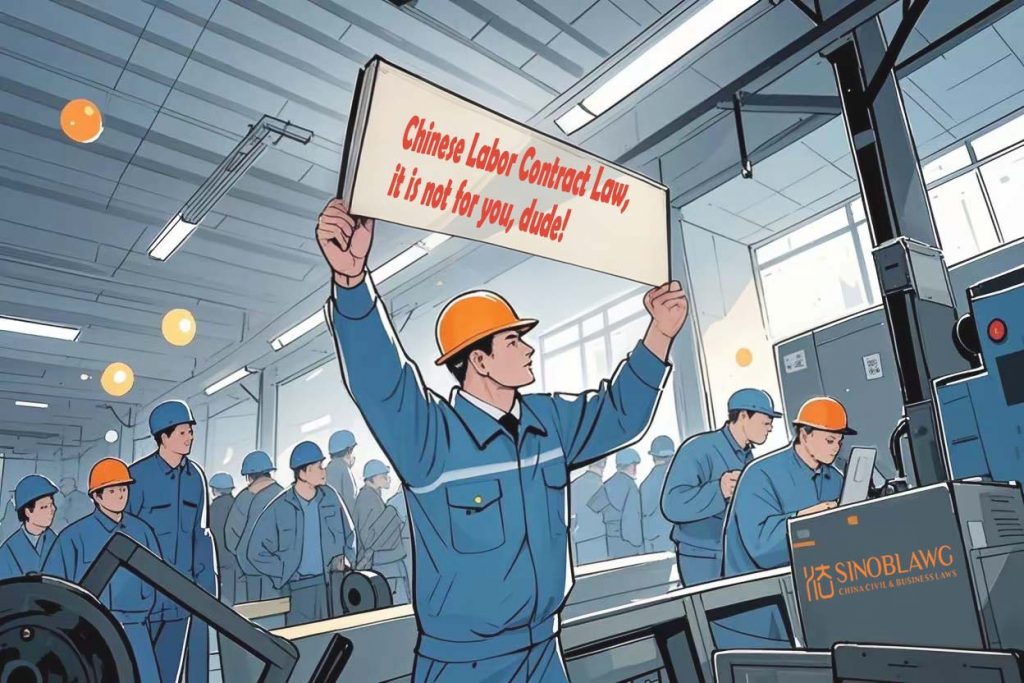An expat working in Shanghai came to me the other day for advice on his non-competition obligation under his labor contract with in foreign invested company here.
The expat was ready to quit the current job and moved forward for a better one. In his contract with the Shanghai employer, he, as a senior manager, was subjected to a non-competition obligation. But the clauses didn’t specify the area or territories in which the non-competition clause shall be observed. This expat was going to move to another country where he would be working in the same industry. However his Shanghai employer somehow had business interests there as the employer exported products there. There is indirect competition between this Shanghai company and the company the expat was to serve in that other country.
In the absence of a clearly defined territory in regard of the non-competition restriction, how should the parties interpret and enforce the clause?
I. Major Law Provision regarding Non-competition
Non-competition restriction was only lately recognized in China Labor Contract Law back in 2008. More recently, China Supreme Court has shed more lights on application of this legal mechanism.
Article 23 of China Labor Contract Law provides:
An Employer and a worker may include in their employment contract provisions on confidentiality matters relating to maintaining the confidentiality of the trade secrets of the Employer and to intellectual property.
If a worker has a confidentiality obligation, the Employer may agree with the worker on competition restriction provisions in the employment contract or confidentiality agreement, and stipulate that the Employer shall pay financial compensation to the worker on a monthly basis during the term of the competition restriction after the termination or ending of the employment contract. If the worker breaches the competition restriction provisions, he shall pay liquidated damages to the Employer as stipulated.
Article 24 of China Labor Contract Law provides:
Personnel subject to competition restriction shall be limited to the employer’s senior management, senior technicians and other employees with a confidentiality obligation. The scope, territory, and term of competition restrictions shall be agreed by the employer and employee, and such agreement shall not violate the laws and regulations.
The term, counted from the termination or ending of the employment contract, for which a person as mentioned in the p receding paragraph is subject to competition restrictions in terms of his working for a competing Employer that produces the same type of products or is engaged in the same type of business as his current Employer, or in terms of his establishing his own business to produce the same type of products or engage in the same type of business, shall not exceed two years.
II. What to Do with the Expat Situation
As China Labor Contract required that territory should be agreed by the parties to the contract, what legal consequence will be there for lack of agreement on territory? Will this deficiency affect the validity of the non-competition clause?
One thing is for sure that this lack will not invalidate the non-competition clause in total. The nut for cracking here is to determine the territory that should be observed. In this case, it nails down to the very question: whether the restriction should extend beyond China borders to the new work place of the expat.
Technically speaking, without clear defining, it should be reasonable to apply the restriction to any place in the world that the current employer has business presence where competition may take place.
Expat employees shall however be cautious to limit the territory to a clearly defined area by country. If possible, confine the restriction within China. Expansion of restriction territory shall reflect and result in increase of compensation payable to the employees.
III. Amount of Compensation for Restriction
How much compensation is reasonable?
Until March of 2013 when China Supreme Court cast light on the question, different places in China have produced different answers. In Shanghai, courts will think it reasonable if the compensation is anywhere between 20%-50% of the employee’s monthly salary.
In the Supreme court interpretation in 2013, it is provided that if the labor contract fails to stipulate an amount of compensation, the employee, after observing the non-competition obligation, may request a compensation equal to 30% of the average monthly salary in the past 12 months prior to termination or ending of labor contract. It is too low, isn’t it? I heard from clients that in the west, such compensation could be equal or even higher than previous monthly salary. Poor Chinese laborers.
It shall be noted that the law does not say 30% is the ceiling amount that can be claimed. In other words, employees can request for higher amount of compensation. But also, this 30% is not the bottom amount that can be offered to employees if agreed by the employees. The interpretation didn’t draw a clear line regarding amount of compensation, leaving it to be decided by the parties through negotiation.
IV. What if the Labor Contract Fails to Stipulate the Amount of Compensation?
While employers are eager to impose a non-competition restriction on the employees, they are not always ready to impose a clear duty to pay compensation. In many cases, the labor contracts are just silent on the amount of the compensation.
In the case of such failure, will the non-competition clause still be valid and binding on the parties? The answer is still not clear even with the issue of the 2013 Supreme court interpretation on China Labor Contract Law.
Before that 2013 Supreme court interpretation, in some places, courts tend to annul the non-competition clause on the ground of unfairness to employees. However in Shanghai, the courts will rather venture to insert an amount between 20% to 50% of the employee’s previous monthly salary to the clause and therefore uphold the validity of the clause.
However, the 2013 judicial interpretation made it quite clear that in the absence of an agreed amount in the contract, the employees shall be entitled to claim 30% of his previous 12-month average monthly salary as compensation provided that he or she observes the restriction in his or her labor contract.
Apparently if the employer is not read to pay compensation, the restriction is not binding on the employees. However, the judicial interpretation failed to tell, in the case of such failure, whether the employer can enforce the non-competition clause by paying an amount equal to 30% of employee’s previous 12-month average monthly salary. Depending on local courts’ understanding the laws and interpretations, different rulings may still persist. But in Shanghai, it is likely that courts will still hold it valid and binding so long as the employer pays a reasonable amount of compensation of 20-50% percentage of his or her previous monthly salary.
This is an area where lawyers may play a critical role in a given case.
Employers shall take heed of such risks by drafting a sound-written non-competition clause or contract with employees.





Is a teacher, art teacher in a Private school, considered as
“Personnel subject to competition restriction shall be limited to the employer’s senior management, senior technicians and other employees with a confidentiality obligation.”
Thank you in advance for your answer.
Tom
you may not be subject to the non-competition obligation, depending on whether you know the confidential information of the school.
Thanks you for your answer.